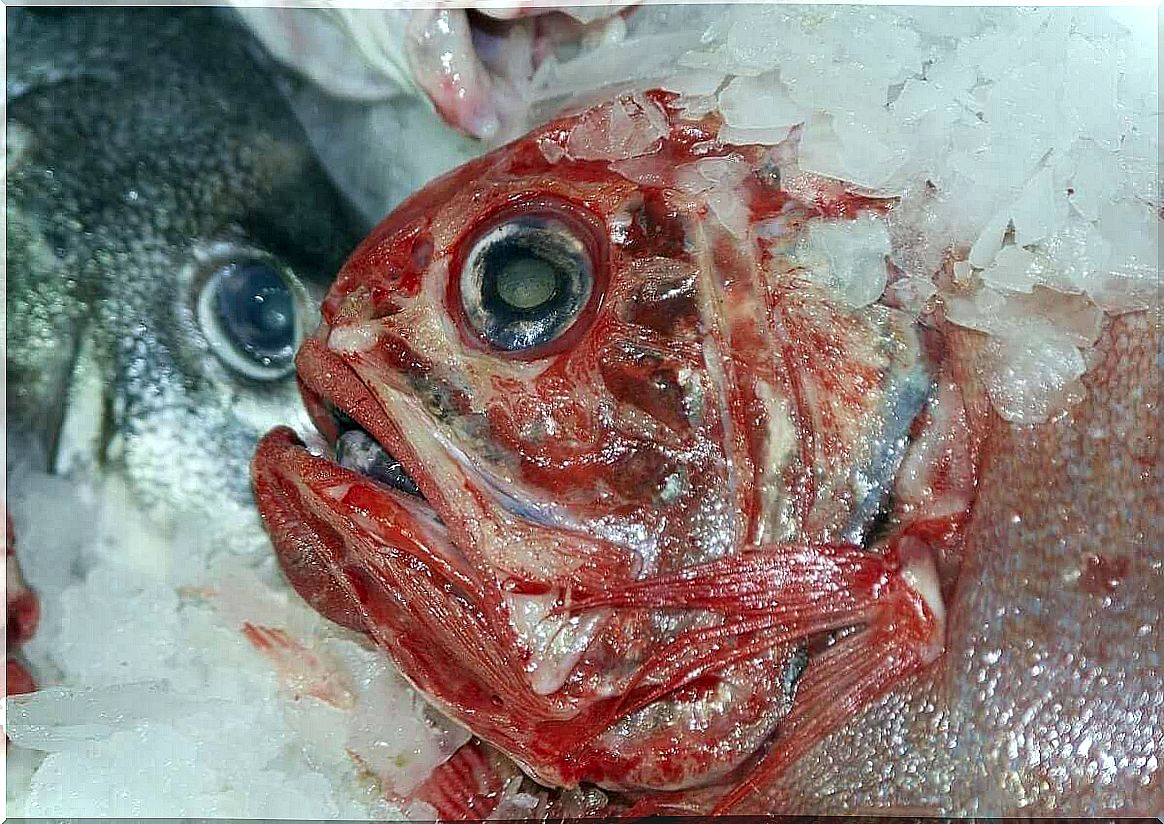All About The Effects Of Mercury In Fish

Nutritionists always tell us that fish is an important source of essential nutrients. However, there are some fish species that can transmit heavy metals such as mercury or foodborne illness. Do you know the effects of mercury present in certain types of fish?
In this regard, the World Health Organization (Spanish link) points out that the main source of human exposure to toxic substances is eating fish and seafood. In particular, these substances affect our health and pose a significant risk in particular to pregnant women and nursing mothers.
Why avoid some types of fish?
It has been known for years that a wide variety of marine animals, especially those at the bottom of the food chain, can accumulate metals such as cadmium, lead and mercury from mining, livestock and agriculture, among others. The effects of mercury in fish can be harmful to our bodies.
The concentrations become so high that they can be deadly. In fact, the mass poisoning that occurred in Japan’s Minamata Bay in the early 1950s is the most well-known case of poisoning from eating fish high in mercury.
The effects of mercury in fish on human health

Poisoning from eating an infected fish can be fatal. It is therefore important to know which varieties pose the greatest risk when consuming them.
According to a study published in the Medical Journal of Chile (Spanish link), the toxicity and effects of mercury in fish are associated with its chemical form, type, exposure dose and age at which it occurs.
When released into the environment, this metal undergoes a series of transformations and participates in cycles between the atmosphere, ocean and land. The 5% that ends up in water (including lakes, lagoons, wetlands, estuaries and oceans) is elemental mercury and accumulates in sediments.
The bacteria living there convert it into methylmercury, which worms and other animals then extract. This is the organic matter that fish eventually ingest and is the one that exhibits the greatest toxicity to living organisms as it causes problems with:
- The nervous system
- The immune system
- The kidneys
- The lungs
- Digestive System
- The skin
- The eyes
Types of fish you should not eat too often
However, based on the above, there are species that can live for more than 100 years, so the ingestion of these substances throughout their lives increases their potential for the absorption of many toxins.
There are also large fish that eat large amounts because their intake is higher. Keep reading as we tell you which types of fish to avoid consuming.
King mackerel (Scomberomorus cavalla)
The king mackerel is a marine fish with an elongated spindle-shaped body. It has a pointed snout and a wide mouth. The fish also has large eyes that are surrounded by a closed bony ring. Small scales cover the entire body and it has a bright blue-green back, with pale green flanks and a silvery belly.
It usually measures 65 centimeters, but males can reach a length of up to 2 meters. This species lives in the Atlantic Ocean from Canada and Massachusetts (United States) to Sao Paulo (Brazil).
Blue marlin (Makaira nigricans)
This is a type of marlin that can be up to 4 meters in length, although it usually measures between 1.80 and 3 meters. It is also known by other names such as ‘Atlantic Blue Marlin’ because of the color it has on its back, however it has silvery white in the belly area.
It has an elongated body and two dorsal fins. His upper jaw is shaped like a sword. This fish usually lives in subtropical and tropical waters of the Atlantic Ocean, including the coasts of the Canary Islands.
It is also found in the Pacific and Indian Oceans. Females weigh about up to 450 kilograms while males usually don’t exceed 160 kilograms.
Emperor Perch (Hgevaltethus atlanticus)

This saltwater fish lives in the east and northwest of the Atlantic Ocean, south of the Pacific and Indian Oceans. Its body is oval and remarkably compressed. He has a big head, small eyes and small teeth. Fishermen usually recognize this species for its dark orange body and red head.
The emperor bass lives at depths of 180 to 1,500 meters and fishermen catch it with mixed bottom trawls as an occasional species. The emperor bass is the longest-lived fish we know of, with an estimated lifespan of 180 years.
Cod (Gadu morhua)
Common cod, also known as ‘Atlantic cod’ or ‘Norwegian cod’, is one of 60 species of migratory fish. It lives in the northeastern Atlantic Ocean from the Barents Sea to the Bay of Biscay, including the waters of Iceland, Greenland and the Baltic Sea.
It is generally small, although some specimens are 2 meters long and can weigh up to 100 kilograms. They feed on other fish such as herring or sardines. This species lives at a depth of 600 meters.
Bigeye tuna (Thunnus obesus)
The bigeye tuna is one of the species that can contain significant amounts of heavy metals. We should point out that this is not the case with Mediterranean tuna.
It lives in tropical and subtropical regions of the Atlantic, Indian and Pacific Oceans, but does not live in the Mediterranean. It reaches a maximum length of 2.50 meters, but is on average about 1.80 meters.
You should not consume these types of fish often
These are some species that can accumulate excess heavy metals, especially methylmercury. We should mention that there are other fish that contain heavy metals, but we have mentioned the ones that usually have dangerous levels of mercury.
Women of childbearing age, pregnant women, nurses and children under the age of 2 are more vulnerable to these toxins due to the negative health effects of mercury. Of course, this does not mean that other populations are not affected.
Remember that eating moderate amounts of some of the fish described will not harm you. So you can consume them occasionally, but make sure you don’t make a habit of it. So you can enjoy the benefits of fish without compromising your health!









